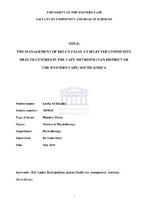The management of Bell’s palsy at selected community health centres in the Cape Metropolitan District of the Western Cape, South Africa
Abstract
Bell’s palsy (BP), a fairly common disorder predominantly prevalent in the adult age group, affects nerves and muscles in the face causing paralysis or dropping of one side of the face. Clients with Bell’s palsy face many challenges, including psychological, physical and emotional. A long recovery period and/or delayed complete healing could lead to a negative effect on many aspects of an individual's life. How society perceives the person could negatively influence the client’s self-confidence. The management of Bell’s palsy depends on the individual case and may include medication, physiotherapy and as a last option, surgery. The aim of the study was to investigate the management of Bell’s palsy at primary health care level in the Cape Metropolitan District of the Western Cape. The study specific objectives was to investigate the management or treatment protocol of clients with Bell’s palsy, to determine the tendency for referral for physiotherapy, to determine whether an association exists between the type of management or treatment received and the recovery of clients with Bell’s palsy and to explore the impact Bell's Palsy has on the clients. The over-arching design of the study was the sequential explanatory mixed methods design where qualitative data was used to assist in explaining and interpreting the findings of a primarily quantitative study. Stratified random sampling was done proportionately to ensure equal representation. A self-administered questionnaire, comprising of four sections, was used to collect quantitative data that was analysed using SPSS version 21. Descriptive statistics was employed to summarise the data on the socio-demographic information of the clients. Inferential statistics was used to determine the distributions of cases in the various groups. Significant differences tested for using the Chisquare test and effect size through Cramer’s V tests. A semi-structured interview guide was developed based on the results of the analysis of the quantitative data. Focus group discussions were employed to a sub-sample of the clients with Bell’s palsy. Permission an ethical clearance will be obtained from Senate Higher Degrees Committee at the University of the Western Cape (UWC), the Western Cape Department of Health and the facility managers of the participating CHCs.

